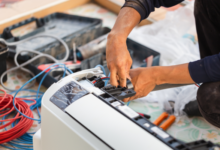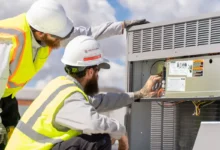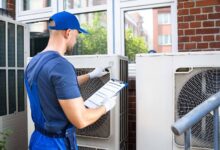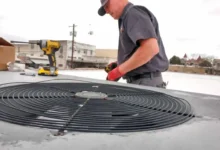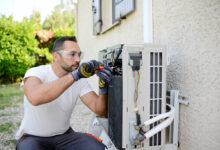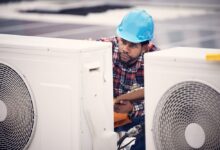HVAC Repair in Mesa, AZ: When Your HVAC System Needs Repair?
HVAC Repair Mesa, AZ – Welcome to our comprehensive guide on HVAC repair in Mesa, AZ! Whether you’re a homeowner or a business owner, having a functional HVAC system is crucial for maintaining a comfortable indoor environment. In this article, we will take an in-depth look at the importance of HVAC repair, the common issues that can arise, and the steps you can take to ensure your system is running efficiently. From scorching summers to chilly winters, Arizona’s extreme temperatures can put a strain on any HVAC system. That’s why it’s essential to have a reliable HVAC repair service in Mesa, AZ, that you can count on. With the right maintenance and timely repairs, you can avoid costly breakdowns and enjoy year-round comfort in your home or office.
Understanding the Importance of HVAC Maintenance
Regular HVAC maintenance is key to keeping your system running smoothly and efficiently. It not only extends the lifespan of your equipment but also improves energy efficiency, which translates into cost savings. During maintenance visits, HVAC professionals will inspect, clean, and lubricate various components of your system, ensuring they operate optimally. They will also check refrigerant levels, tighten electrical connections, and calibrate thermostats for accurate temperature control.
Moreover, HVAC maintenance allows for the early detection of potential issues. By identifying and addressing minor problems before they escalate, you can avoid expensive repairs or even the need for a complete system replacement. It’s recommended to schedule maintenance visits at least twice a year – once before the cooling season and once before the heating season – to ensure your HVAC system is ready to handle the demands of each season.
The Benefits of Regular HVAC Maintenance
Regular HVAC maintenance offers numerous benefits that go beyond just preventing breakdowns. Here are some key advantages:
- Improved energy efficiency: By fine-tuning your HVAC system, maintenance ensures that it operates at its peak efficiency, reducing energy consumption and lowering utility bills.
- Enhanced comfort: Properly maintained systems distribute air evenly throughout your home, eliminating hot or cold spots and ensuring consistent comfort in every room.
- Extended equipment lifespan: When components are well-maintained, they experience less wear and tear, leading to a longer lifespan for your HVAC system.
- Improved indoor air quality: Regular maintenance includes cleaning or replacing air filters, which helps remove dust, allergens, and pollutants from the air, promoting healthier indoor environments.
- Reduced likelihood of emergency breakdowns: By catching potential issues early on, regular maintenance reduces the chances of unexpected system failures during extreme weather conditions.
DIY HVAC Maintenance Tips
While it’s crucial to have professional HVAC maintenance performed regularly, there are also some simple tasks you can do yourself to keep your system in good shape:
- Clean or replace air filters: Dirty filters restrict airflow and reduce system efficiency. Check your filters monthly and clean or replace them as needed.
- Clean the outdoor unit: Ensure the outdoor condenser unit is free of debris, such as leaves and grass clippings. Use a soft brush or vacuum to remove any accumulated dirt or dust.
- Keep vents unobstructed: Ensure that vents and registers are not blocked by furniture, rugs, or other items. This allows for proper airflow and more efficient heating and cooling.
- Check thermostat settings: Regularly check and fine-tune your thermostat settings to ensure they are accurately reflecting your comfort needs. Consider investing in a programmable thermostat for even greater energy savings.
- Check and clean condensate drain lines: Over time, condensate drain lines can become clogged, leading to water leaks or system malfunctions. Inspect and clean these lines to prevent issues.
Signs Your HVAC System Needs Repair
Recognizing the signs that your HVAC system needs repair can save you from costly breakdowns and ensure your comfort is not compromised. Here are some common indicators that it’s time to call a professional:
- Insufficient heating or cooling: If your HVAC system is struggling to reach and maintain the desired temperature, it may indicate an issue that requires repair.
- Strange noises: Unusual sounds such as grinding, squeaking, or banging coming from your HVAC system should not be ignored. These noises often signal mechanical problems that need attention.
- Foul odors: Persistent musty, burning, or rotten egg smells may indicate mold growth, electrical issues, or gas leaks, all of which require immediate professional attention.
- Inconsistent airflow: If some rooms in your home are receiving little to no airflow while others are excessively drafty, it could be a sign of ductwork or blower motor problems.
- Increased energy bills: A sudden spike in your energy bills without a change in usage patterns may indicate that your HVAC system is no longer operating efficiently and requires repair.
The Role of HVAC Filters and How to Change Them
HVAC filters play a crucial role in maintaining indoor air quality and system efficiency. These filters trap dust, allergens, and other airborne particles, preventing them from circulating throughout your home. Over time, the filters become dirty and clogged, reducing airflow and straining your HVAC system. It’s important to regularly change or clean these filters to ensure optimal performance.
The frequency of filter changes depends on factors such as the type of filter, the number of occupants in your home, and the presence of pets or allergies. As a general guideline, disposable filters should be changed every one to three months, while reusable filters should be cleaned according to the manufacturer’s instructions. It’s worth noting that homes with pets or allergy sufferers may require more frequent filter changes or cleanings.
To change an HVAC filter, follow these steps:
- Locate the filter: Filters are typically found near the return air duct or within the HVAC unit itself.
- Turn off the system: Before removing the filter, switch off the HVAC system to prevent any debris from being pulled into the system.
- Remove the old filter: Slide out the old filter carefully, being mindful of any accumulated dust or dirt.
- Install the new filter: Ensure that the new filter is correctly oriented (follow the arrows indicating airflow direction) and slide it into place.
- Turn on the system: Once the new filter is securely in place, you can turn the HVAC system back on.
Troubleshooting Common HVAC Problems
While some HVAC issues require professional attention, there are a few troubleshooting steps you can take before calling in the experts. Here are some common problems and potential solutions:
No Cooling or Heating
If your HVAC system isn’t providing any cooling or heating, check the following:
- Thermostat settings: Ensure that the thermostat is set to the desired temperature and mode (cooling or heating).
- Power supply: Check that the HVAC system is receiving power. Look for tripped circuit breakers or blown fuses.
- Air filters: Dirty filters can restrict airflow and cause your system to function poorly. Check and clean or replace the filters as needed.
- Outdoor unit: Inspect the outdoor unit for any debris or obstructions. Clean the unit and remove any blockages.
- Ductwork: Check for any visible damage or disconnected ducts that may be preventing airflow.
Inadequate Cooling or Heating
If your HVAC system is running but not providing adequate cooling or heating, consider these troubleshooting steps:
- Thermostat settings: Ensure that the thermostat is set to the correct temperature and mode. Also, check if the fan is set to “auto” rather than “on” to prevent constant airflow.
- Dirty coils: Dust and debris on the indoor or outdoor coils can hinder heat transfer. Clean the coils carefully to improve efficiency.
- Refrigerant levels: Low refrigerant levels can affect cooling performance. If you suspect a refrigerant leak, contact a professional for repair.
- Ductwork leaks: Inspect your ductwork for any visible leaks or gaps. Seal them with duct tape or contact a professional for more extensive repairs.
- Blocked vents: Ensure that all vents and registers are open and unobstructed to allow for proper airflow.
Strange Noises
If your HVAC system is making unusual noises, it’s essential to identify the source and take appropriate action:
- Rattling or banging: Loose components or debris within the system can cause these noises. Inspect the system and tighten any loose parts or remove any obstructions.
- Squeaking or squealing: These sounds often indicate a worn-out belt or motor bearings. Lubricate the affected parts or contact a professional for replacement.
- Grinding or clicking: These noises may suggest motor or electrical issues. Turn off the system and consult a professional for inspection and repair.
Foul Odors
If your HVAC system is emitting unpleasant odors, it’s important to address the issue promptly to ensure the health and safety of your household. Here are some potential causes and solutions for different odors:
Musty Odors
A musty smell often indicates the presence of mold or mildew within your HVAC system. Mold can thrive in damp areas such as condensate pans or ductwork. To tackle this issue:
- Inspect and clean the condensate drain pan: Mold can grow in the standing water that accumulates in the condensate drain pan. Clean the pan and ensure proper drainage to prevent mold growth.
- Clean or replace air filters: Dirty filters can become a breeding ground for mold. Regularly clean or replace your filters to minimize the risk of mold growth and musty odors.
- Consider UV germicidal lights: These lights can be installed within your HVAC system to kill mold and bacteria, improving indoor air quality.
Burning Odors
A burning smell is a cause for immediate concern, as it may indicate an electrical issue or overheating components. If you detect a burning odor:
- Turn off the system: Switch off your HVAC system at the thermostat to prevent any potential fire hazards.
- Check for visible damage: Inspect the system for any frayed wires, melted insulation, or other signs of electrical damage. If you identify any issues, contact a professional electrician or HVAC technician for repair.
- Call a professional: If you cannot identify the source of the burning smell or if it persists after inspecting the visible components, contact a professional HVAC technician for further investigation and repair.
Rotten Egg Odors
A rotten egg smell can be indicative of a gas leak, which poses a severe safety hazard. If you detect this odor:
- Evacuate the premises: If you suspect a gas leak, leave your home immediately and ensure that everyone else does the same. Do not use any electrical devices or create sparks that could ignite the gas.
- Call the gas company: From a safe location, contact your gas company or emergency services to report the potential gas leak and follow their instructions.
- Do not re-enter the premises: Wait until the gas company or emergency services have deemed it safe before returning to your home.
The Benefits of Regular HVAC Inspections
Regular HVAC inspections are essential for maintaining the performance and longevity of your system. By scheduling professional inspections, you can catch minor issues before they become major problems, saving you time, money, and inconvenience. Here are some key benefits of regular HVAC inspections:
Early Detection of Problems
During an inspection, HVAC technicians will thoroughly examine your system, looking for any signs of wear, damage, or potential issues. By identifying and addressing these problems early on, you can prevent them from worsening and causing extensive damage to your system.
Improved Energy Efficiency
An HVAC system that is poorly maintained or has underlying issues will operate less efficiently, leading to higher energy bills. During an inspection, technicians will check and optimize your system’s components, ensuring that it runs at its peak efficiency. This results in energy savings and lower utility costs.
Extended Equipment Lifespan
Regular inspections and maintenance can significantly extend the lifespan of your HVAC equipment. By addressing minor issues promptly and keeping your system clean and well-maintained, you can avoid premature system failure and the need for costly replacements.
Safer Operation
HVAC systems that are neglected or have underlying problems can pose safety hazards. For example, electrical issues can lead to fires, and gas leaks can be extremely dangerous. During an inspection, technicians will check for any potential safety concerns and ensure that your system operates safely.
Compliance with Warranty Requirements
Many HVAC manufacturers require regular professional maintenance as a condition for maintaining the warranty on their equipment. By scheduling regular inspections, you can ensure that you comply with these requirements, protecting your investment and potential repair or replacement costs.
The Inspection Process
During an HVAC inspection, a qualified technician will perform a series of checks and tests to evaluate the overall condition and performance of your system. This typically includes:
- Thermostat calibration and functionality testing
- Inspection and cleaning of the blower motor and fan
- Examination of electrical connections and components
- Checking refrigerant levels and inspecting for leaks
- Inspecting and cleaning the condensate drain and pan
- Examining and cleaning the outdoor condenser unit
- Testing the operation of safety features
- Checking airflow and ductwork for issues or obstructions
Based on the inspection findings, the technician will provide recommendations for any necessary repairs or improvements to ensure the optimal performance of your HVAC system.
How to Choose the Right HVAC Repair Service in Mesa, AZ
When it comes to selecting an HVAC repair service in Mesa, AZ, it’s essential to choose a company that is reliable, reputable, and capable of handling your specific HVAC needs. Here are some key factors to consider when making your decision:
Licensing and Certification
Ensure that the HVAC repair service you choose is properly licensed and certified to operate in Mesa, AZ. Proper licensing indicates that the company meets the necessary requirements and has the knowledge and expertise to perform HVAC repairs.
Experience and Expertise
Look for a repair service with a proven track record of experience in the HVAC industry. A company that has been in business for several years and has a team of skilled technicians is more likely to deliver quality repairs and customer satisfaction.
Range of Services
Consider the range of services offered by the HVAC repair service. Ideally, they should be able to handle a wide variety of HVAC repairs, installations, and maintenance tasks. This ensures that they can address any issues that arise and provide comprehensive solutions.
24/7 Emergency Service
Heating and cooling emergencies can happen at any time, often when you least expect them. Look for an HVAC repair service that offers 24/7 emergency service, allowing you to get prompt assistance whenever you need it.
Reputation and Reviews
Research the reputation of the HVAC repair service by reading customer reviews and testimonials. Look for positive feedback regarding the company’s professionalism, reliability, and quality of work. You can also ask for referrals from friends, family, or neighbors who have used their services before.
Fair Pricing
While cost should not be the sole determining factor, it’s important to consider pricing. Obtain quotes from multiple HVAC repair services and compare their rates. Keep in mind that the lowest price may not always be the best option, as quality and expertise should also be taken into account.
Warranty and Guarantees
Inquire about the warranty and guarantees offered by the HVAC repair service. A reputable company should stand behind their work and provide warranties on parts and labor. This gives you peace of mind knowing that they will rectify any problems that arise after the repair.
The Importance of Proper HVAC System Sizing
Proper HVAC system sizing is crucial for efficient and effective heating and cooling in your home or office. A system that is too large or too small for your space can lead to a range of issues, including poor comfort, inefficiency, and increased energy costs.
Undersized HVAC Systems
An undersized HVAC system is unable to adequately heat or cool your space, resulting in discomfort and inefficiency. The system will constantly run in an attempt to meet the temperature demands, leading to increased energy consumption and higher utility bills. Additionally, an undersized system may struggle to remove humidity from the air, resulting in a damp and uncomfortable indoor environment.
Oversized HVAC Systems
An oversized HVAC system may cool or heat your space quickly, but it will not run long enough to effectively remove humidity. This can lead to a clammy and uncomfortable environment. Additionally, oversized systems have shorter operating cycles, which can cause more frequent on-off cycling, leading to increased wear and tear on the equipment and potential issues with temperature control. Moreover, an oversized system may consume more energy than necessary and result in higher utility bills.
The Importance of Proper HVAC Sizing Calculations
Proper HVAC system sizing requires accurate calculations based on various factors, including the square footage of the space, insulation levels, number of windows, local climate, and more. An experienced HVAC contractor will perform a load calculation to determine the appropriate system size for your specific needs.
HVAC System Sizing Process
The HVAC system sizing process involves several steps:
- Load calculation: The contractor will assess the cooling and heating loads required to maintain a comfortable indoor environment. This calculation takes into account factors such as the square footage, insulation, number of occupants, and more.
- Ductwork evaluation: Proper duct sizing is essential for optimalairflow and distribution. The contractor will evaluate the existing ductwork system to ensure it can accommodate the airflow requirements of the properly sized HVAC system.
- Evaluating insulation levels: Insufficient insulation can impact the efficiency of your HVAC system. The contractor will assess the insulation in your walls, ceilings, and floors to ensure it meets the recommended standards.
- Considering other factors: The contractor will take into account additional factors such as the number of windows, their orientation, and the local climate to determine the appropriate HVAC system size.
- System selection: Based on the load calculation and evaluation of various factors, the contractor will recommend the right-sized HVAC system for your space. They will consider the cooling capacity (measured in BTUs) and heating capacity (measured in BTUs or tons) to ensure optimal performance.
It’s crucial to rely on a professional HVAC contractor to perform the proper sizing calculations and guide you in selecting the appropriate system for your specific needs. Investing in the right-sized HVAC system will ensure efficient operation, improved comfort, and energy savings in the long run.
Energy-Efficient HVAC Upgrades and Their Benefits
Energy-efficient HVAC upgrades can have a significant impact on both your comfort and your energy bills. By investing in these upgrades, you can reduce energy consumption, lower your environmental footprint, and potentially qualify for energy-saving incentives. Here are some common energy-efficient HVAC upgrades and their benefits:
High-Efficiency HVAC Systems
Upgrading to a high-efficiency HVAC system can result in substantial energy savings. These systems are designed to operate more efficiently and consume less energy than older, less efficient models. Benefits of high-efficiency systems include:
- Lower energy bills: High-efficiency HVAC systems use advanced technology and design features to minimize energy consumption, resulting in reduced utility costs.
- Improved comfort: These systems often include features such as variable-speed motors and multi-stage compressors, allowing for more precise temperature control and consistent comfort.
- Reduced environmental impact: By consuming less energy, high-efficiency HVAC systems help reduce greenhouse gas emissions and promote environmental sustainability.
Programmable Thermostats
Installing a programmable thermostat offers both convenience and energy savings. These thermostats allow you to set different temperature schedules based on your daily routine, ensuring that your HVAC system operates efficiently when needed. Benefits of programmable thermostats include:
- Energy savings: With programmable thermostats, you can automatically adjust the temperature when you’re away or asleep, reducing energy usage during those times and resulting in lower utility bills.
- Increased comfort and convenience: Programmable thermostats allow you to customize temperature settings according to your preferences, ensuring a comfortable environment when you’re at home.
- Smart home integration: Many programmable thermostats can be connected to smart home systems, allowing for remote control and monitoring of your HVAC system through mobile devices.
Zoned HVAC Systems
Zoned HVAC systems divide your home or office into different zones, each with its thermostat and independent temperature control. This allows you to heat or cool specific areas based on occupancy and comfort requirements. Benefits of zoned HVAC systems include:
- Energy savings: By heating or cooling only the occupied areas, zoned systems can reduce energy consumption and lower utility bills.
- Customized comfort: Zoned systems provide individual temperature control in different areas, allowing occupants to set their preferred temperatures for maximum comfort.
- Reduced wear and tear: Zoning helps prevent overworking your HVAC system by directing airflow only to the areas that need conditioning, reducing the strain on the equipment and potentially extending its lifespan.
Duct Sealing and Insulation
Leaky ductwork and insufficient insulation can result in significant energy loss and reduced HVAC efficiency. Upgrading your ductwork with proper sealing and insulation can have several benefits:
- Energy savings: Sealing and insulating ductwork can prevent conditioned air from escaping, reducing energy waste and lowering utility bills.
- Improved indoor air quality: Properly sealed ducts prevent dust, allergens, and pollutants from entering the system and being distributed throughout your home, promoting cleaner indoor air.
- Enhanced comfort: Sealed and insulated ducts ensure that conditioned air reaches its intended destinations, eliminating drafts and temperature variations.
Smart HVAC Controls
Smart HVAC controls integrate advanced technology and connectivity to enhance the efficiency and convenience of your HVAC system. Benefits of smart HVAC controls include:
- Remote access and control: Smart thermostats and control systems allow you to adjust your HVAC settings remotely using your smartphone or other devices, ensuring optimal comfort and energy savings.
- Learning capabilities: Some smart controls can learn your preferences and adjust temperature settings automatically, optimizing energy usage based on your habits and occupancy patterns.
- Energy usage monitoring: Smart controls provide real-time energy usage data, allowing you to track and analyze your HVAC system’s efficiency and identify areas for improvement.
The Future of HVAC Technology
The HVAC industry is constantly evolving, with advancements in technology shaping the future of heating, ventilation, and air conditioning systems. These innovations aim to enhance energy efficiency, improve comfort, and reduce environmental impact. Here are some exciting developments in HVAC technology:
Smart HVAC Systems
Smart HVAC systems integrate advanced sensors, machine learning algorithms, and connectivity to optimize energy usage and comfort. These systems can learn your preferences, adjust settings automatically, and provide real-time data for energy analysis. Smart HVAC systems offer benefits such as:
- Increased energy efficiency: Smart systems can monitor and adjust HVAC settings based on occupancy patterns, weather conditions, and energy prices, optimizing energy usage and reducing waste.
- Improved comfort and convenience: These systems offer precise temperature control, remote access, and advanced scheduling features, ensuring optimal comfort and convenience for occupants.
- Energy usage insights: Smart HVAC systems provide detailed energy consumption data, allowing users to track their usage, identify inefficiencies, and make informed decisions to reduce energy waste.
Sensor Technology
Advancements in sensor technology are revolutionizing the HVAC industry. Smart sensors can detect occupancy, temperature, humidity, and air quality, enabling HVAC systems to respond dynamically to changing conditions. Benefits of sensor technology include:
- Energy savings: Sensors can detect when a room is unoccupied and adjust HVAC settings accordingly, saving energy by avoiding unnecessary heating or cooling.
- Improved indoor air quality: Air quality sensors can monitor pollutants and trigger ventilation or filtration systems to maintain clean and healthy indoor environments.
- Enhanced comfort: Sensors can detect temperature variations and adjust HVAC settings to maintain consistent comfort throughout a space.
Renewable Energy Integration
The integration of renewable energy sources, such as solar power, into HVAC systems is becoming increasingly popular. By harnessing clean and sustainable energy, HVAC systems can reduce reliance on fossil fuels and lower environmental impact. Benefits of renewable energy integration include:
- Energy cost savings: Solar-powered HVAC systems can generate electricity to power the system, reducing reliance on traditional energy sources and lowering utility bills.
- Environmental sustainability: By utilizing renewable energy, HVAC systems can significantly reduce greenhouse gas emissions and contribute to a cleaner and greener future.
- Energy independence: Generating your own energy through renewable sources provides a level of self-sufficiency and protection against rising energy costs.
Improved Energy Storage
Advancements in energy storage technologies are crucial for maximizing the efficiency of HVAC systems. Energy storage allows excess energy to be stored and used during times of high demand or when renewable energy sources are not available. Benefits of improved energy storage include:
- Increased grid stability: Energy storage systems can help balance supply and demand, reducing strain on the electrical grid during peak usage periods.
- Optimized energy usage: Excess energy generated by HVAC systems can be stored and used later, avoiding waste and maximizing the use of renewable energy sources.
- Backup power: Energy storage systems can provide backup power during outages, ensuring continuous operation of critical HVAC functions.
In conclusion, the HVAC industry is continuously advancing, offering innovative solutions to improve comfort, energy efficiency, and environmental sustainability. By staying informed about these developments and considering energy-efficient upgrades, you can enhance the performance of your HVAC system, reduce energy costs, and contribute to a greener future.
